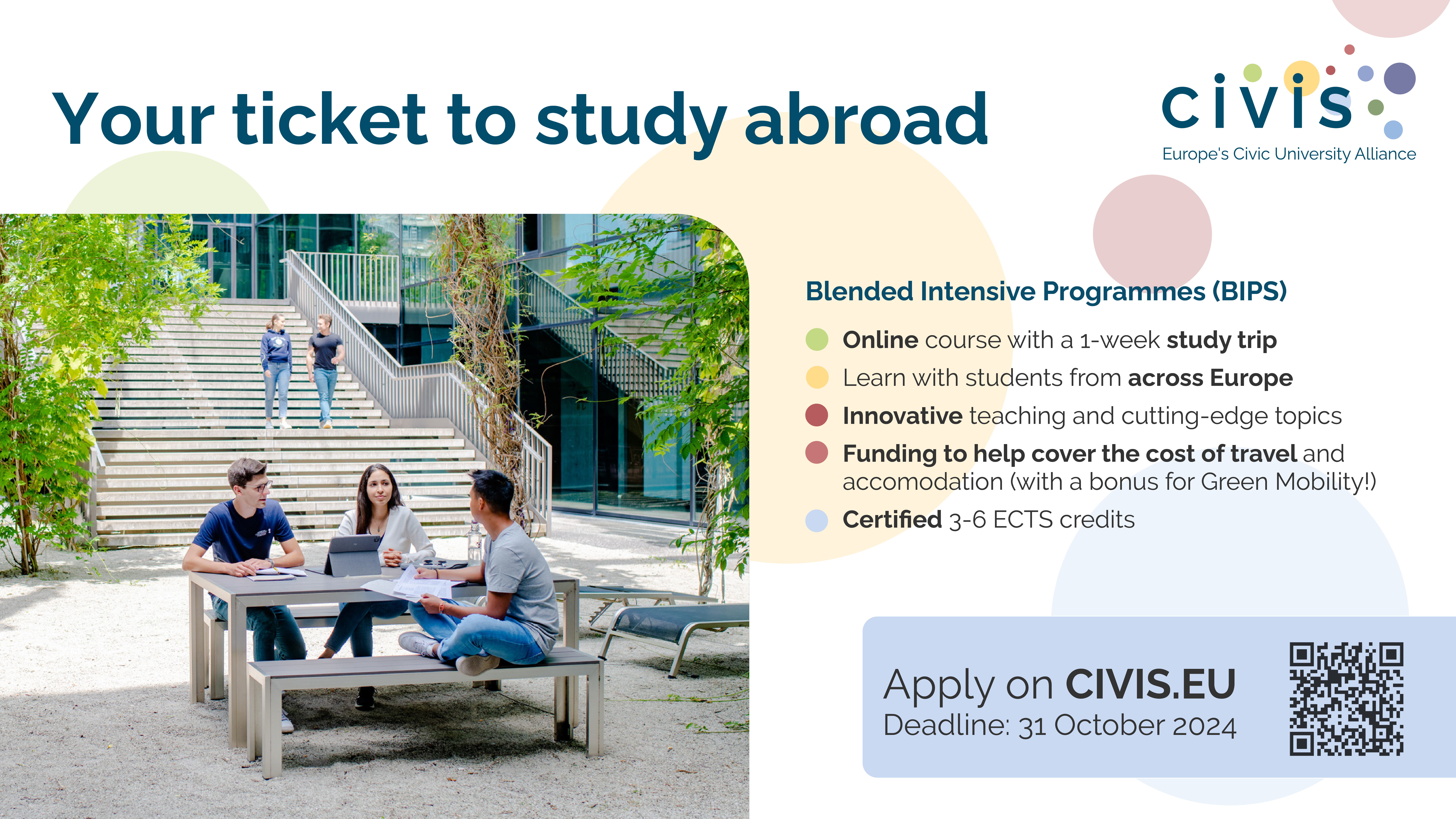Registrations are open for nearly 50 Blended Intensive Programmes for CIVIS students

Transcending the limits of traditional courses, Blended Intensive Programmes are a form of mobility within the Erasmus+’ programme. Depending on the topic and the setup, a BIP might attract students from different disciplines and a broad range of countries, even beyond Europe.
A BIP for every CIVIS priority theme
The BIPs cover all 5 main themes of the Alliance and are now available for registration on our dedicated courses page:
- Climate, environment and energy
- Society, culture, heritage
- Health
- Cities, territories and mobilities
- Digital and technological transformation
While taking part in a BIP, the students participate in online learning from home. The virtual session is then followed by a 5 days physical mobility to another CIVIS member university, to allow participants to work alongside professors and students from across the Alliance and beyond.
CIVIS students from every level and field of study can now apply directly via the CIVIS Portal and get the opportunity to participate in one of these programmes.
Programmes also open for students from CIVIS' strategic partner universities in Africa
Students from CIVIS’ strategic partner universities in Africa are also welcome to apply for 4 of the programmes, offered by UNIL:
- Mental Health, Sport & Physical Activtiy
- A l’école des Anciens. War and its representations from the perspective of ancient rhetoric
- Exploring Language Varieties in the Diaspora: Methodological and Theoretical Approaches
- Humanities within medicine and health
but also for others, supported by Erasmus+ grants and covering travel and subsistence costs during their stay. For these, applicants should be willing to extend their stay at the host university for 1-3 weeks for additional research and/or training purposes:
- Religion and power in the Eastern Mediterranean
- Let's prove it! Reasoning in different contexts
- Europe and the rule of law
- Interplay of Landscape, Tectonics and Climate Change in the Mediterranean context
- PostRacial Transmodernities: Afro-European Relations, Mediterranean Trajectories & Intercultural Reciprocities
- Quantifying vulnerability to natural hazards in changing climate patterns. New perspectives and methods
- Non-coding RNAs in Health and Disease
- European Renaissance IV: Western versus Eastern Europe
- Environmental challenges facing Danube River Basin
- Refugees, Migrants, and Exiles in German and Comparative Literature
- Medical Matters in Post/colonial Situations (Matérialités médicales en situations post/coloniales)
- Euro-African Trade and Investment Relations and the Polycrisis
- Scientific Communication and Linguistic Corpora: Tools for Interdisciplinary Research
- How to write a paper and talk about science
- Surgical Anatomy- from theory to dissection
Main requirements
Each individual course has its own requirements. Most of them are taught in English (some in French), therefore a minimum level of knowledge is required. Also, for most of them, the selection process is based on students’ CV and Motivation letter, thus a special attention is recommended in writing these documents. Pursuing a BIP offers students 3 to 6 ECTS credits, depending on the workload.
BIPs advantages
Visiting another country, to learn alongside students from across Europe, with no financial cost, is one of the greatest advantages of the BIPs. These types of programmes offer an enriching experience, combining knowledge, engagement and rich encounters!
The BIPs have been organised for more than 2 years now, and hundreds of students have discovered that their dream of studying abroad can come true in a new, convenient, and innovative way.
The answers to all your questions can be found here.
